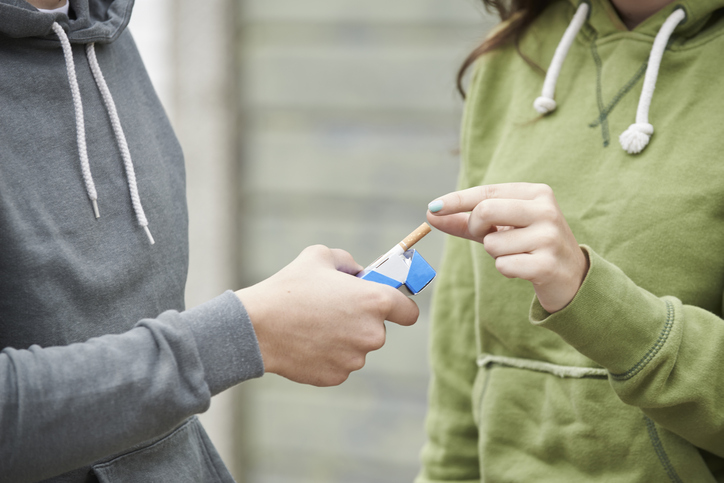Tuesday, 18 June 2019
New research has found that reality TV programmes like Love Island, TOWIE and Geordie Shore have exposed children and young people to smoking and alcohol, partly because they’re available on catch-up outside the 9pm watershed.
The study by experts from the University of Nottingham’s Centre for Tobacco and Alcohol Studies found that reality shows contain much higher levels of tobacco and alcohol content than other primetime TV programme genres. The in-depth analysis is published in the Journal of Public Health.
The research team previously reported high levels of tobacco imagery, including branding, in the 2017 series of Love Island. However, after complaints over the level of smoking in that series, an editorial decision was made to remove smoking content. The team’s new study found no tobacco content in the 2018 series of Love Island.

For this new study, the researchers measured depictions of alcohol and tobacco products on Made in Chelsea, The Only Way is Essex, Geordie Shore and Love Island and the now discontinued Celebrity Big Brother,all airing on UK channels for a total of 112 episodes between January and August 2018. They measured the number of one-minute intervals containing tobacco and/or alcohol imagery, including actual use, implied use, tobacco or alcohol-related materials, and product-specific branding, and estimated viewer exposure to the imagery on screen.
Audience viewing figures were combined with mid-year population estimates for 2017 to estimate overall and individual impressions—separate incidents seen—by age group for each of the coded episodes.

Alcohol content appeared in all 112 episodes and in 2,212 one-minute intervals, or 42% of all intervals studied. 18% of intervals included actual alcohol consumption, while 34% featured inferred consumption, predominantly characters holding alcoholic drinks. The greatest number of intervals including any alcohol content occurred in Love Island. Alcohol branding occurred in 1% of intervals and was most prevalent in Geordie Shore (51 intervals, 69% of episodes). Forty brands were identified, the most common being Smirnoff vodka (23 intervals, all but one of which occurred in Geordie Shore).
Tobacco content appeared in 20 episodes, in 110 or 2% of all intervals studied. Almost all (98%) of this content occurred in a single reality TV series, Celebrity Big Brother. This included actual tobacco use, inferred tobacco use, and tobacco paraphernalia. Tobacco branding was not present.

When all the data were combined with audience viewing figures and population estimates, the researchers estimate that the 112 episodes delivered 4.9 billion overall alcohol impressions to the UK population, including 580 million to children under the age of 16, as well as 214 million overall tobacco impressions, including 47 million to children under 16.
Lead researcher on the study, Alexander Barker, from the University’s Division of Epidemiology and Public Health, said: “Starting to smoke or drink alcohol at a young age is a strong predictor of dependence and continued use in later life. Recent data shows that 44% of 11 to 15-year-olds in England have had an alcoholic drink, and 19% have tried smoking.
“Given that seeing alcohol or tobacco imagery in the media promotes use among young people, our study therefore identifies reality television shows as a major potential driver of alcohol and tobacco consumption in young people in the UK. Tighter scheduling rules, such as restricting the amount of content and branding shown in these programmes, could prevent children and adolescents from being exposed to the tobacco and alcohol content.”
Given that seeing alcohol or tobacco imagery in the media promotes use among young people, our study therefore identifies reality television shows as a major potential driver of alcohol and tobacco consumption in young people in the UK.
The full research paper is available here: https://doi.org/10.1093/pubmed/fdz043
Story credits
More informationis available from Alex Barker,Centre for Tobacco and Alcohol Studies, Division of Epidemiology and Public Health, University of Nottingham on 0115 823 1347 or email alexander.barker@nottingham.ac.uk
Notes to editors:
About the University of Nottingham
Ranked 97 in the world and 17th in the UK by the QS World University Rankings, the University of Nottingham is a founding member of Russell Group of research-intensive universities. Studying at the University of Nottingham is a life-changing experience, and we pride ourselves on unlocking the potential of our students. We have a pioneering spirit, expressed in the vision of our founder Sir Jesse Boot, which has seen us lead the way in establishing campuses in China and Malaysia - part of a globally connected network of education, research and industrial engagement.
Nottingham was crowned Sports University of the Year by The Times and Sunday Times Good University Guide 2024 – the third time it has been given the honour since 2018 – and by the Daily Mail University Guide 2024.
The university is among the best universities in the UK for the strength of our research, positioned seventh for research power in the UK according to REF 2021. The birthplace of discoveries such as MRI and ibuprofen, our innovations transform lives and tackle global problems such as sustainable food supplies, ending modern slavery, developing greener transport, and reducing reliance on fossil fuels.
The university is a major employer and industry partner - locally and globally - and our graduates are the third most targeted by the UK's top employers, according to The Graduate Market in 2024 report by High Fliers Research.
We lead the Universities for Nottingham initiative, in partnership with Nottingham Trent University, a pioneering collaboration between the city’s two world-class institutions to improve levels of prosperity, opportunity, sustainability, health and wellbeing for residents in the city and region we are proud to call home.
More news…